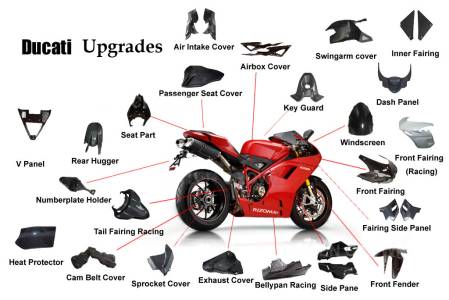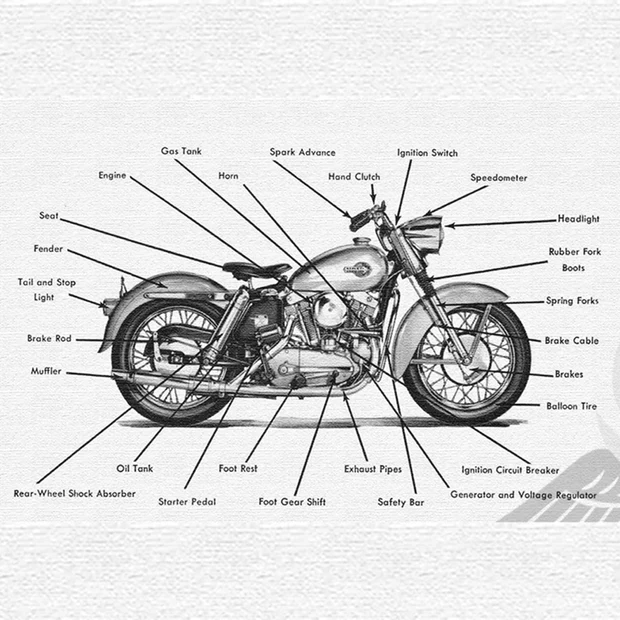Most Commonly Replaced Motorcycle Parts Auckland for Riders in Auckland
Most Commonly Replaced Motorcycle Parts Auckland for Riders in Auckland
Blog Article
Discover the Necessary Motorcycle Parts You Required for Ideal Performance
Comprehending the vital parts of a bike is basic for accomplishing peak efficiency. Each component, from the engine to the braking system, plays an essential duty in total functionality and security. Routine upkeep can avoid unforeseen failings and improve the riding experience. Nonetheless, numerous motorcyclists neglect the ins and outs of these systems. Finding just how they collaborate can bring about an extra reliable experience. What essential parts should every motorcyclist focus on?
The Engine: The Heart of Your Motorbike
The engine works as the core element of a motorbike, driving its efficiency and specifying its capacities. It is in charge of converting fuel into mechanical power, which powers the bike ahead. Various kinds of engines are used, including single-cylinder, V-twin, and inline configurations, each offering distinct qualities suited for different riding objectives and styles. The engine dimension, typically gauged in cubic centimeters (cc), significantly affects performance, with larger engines typically giving more power and torque.Furthermore, the engine's layout and technology, such as fuel shot systems or air-cooling versus liquid-cooling, impact efficiency and integrity. Upkeep is necessary for peak operation; variables like normal oil changes and monitoring stimulate plugs assurance longevity. Motorcyclists usually consider an engine's responsiveness and level of smoothness, as these qualities boost the overall riding experience. Inevitably, the engine remains an essential component that defines not only the motorbike's performance however additionally the motorcyclist's connection to the maker.
The Transmission: Shifting Gears Efficiently
The transmission plays an essential role in a motorbike's performance, particularly in the technicians of equipment changing. Comprehending how to move equipments efficiently can boost the general riding experience, while normal upkeep assurances peak functionality. Appropriate focus to these elements can greatly impact the longevity and effectiveness of the motorbike.

Gear Shifting Mechanics
Smooth equipment moving is crucial for ideal motorbike performance, greatly impacting both acceleration and control. The mechanics of gear changing entail the communication in between the clutch, gear lever, and transmission system. When a rider engages the clutch, it disengages the engine from the transmission, enabling a gear adjustment without harming the parts. A well-timed launch of the clutch, combined with precise movement of the equipment lever, helps with a seamless change in between equipments. This procedure assures that the engine operates within its best power band, improving performance. Bike Parts Wellington. In addition, recognizing the equipment ratios and their result on speed and torque can assist motorcyclists make notified choices throughout shifts, ultimately adding to a much more enjoyable and receptive riding experience
Maintenance Tips Relevance
Regular maintenance plays an essential function in ensuring that the transmission system operates successfully, enabling for smooth gear shifts. Routinely transforming the transmission and inspecting liquid is crucial, as old fluid can cause increased rubbing and wear. Additionally, evaluating the clutch for wear guarantees peak involvement and disengagement, stopping slippage during equipment changes. Lubrication of relocating components is similarly vital to minimize rubbing and improve efficiency. Motorcycle owners should likewise check for leakages and unusual noises, as these can suggest underlying issues. By sticking to these upkeep tips, motorcyclists can lengthen the lifespan of their transmission system, guaranteeing that gear shifts stay smooth and adding to the overall performance of their motorbike.
The Braking System: Ensuring Security on Every Trip
Braking systems are basic components that directly influence a motorbike's safety and performance. They include numerous components, consisting of brake pads, rotors, calipers, and hydraulic lines, all collaborating to ensure effective slowdown. The type of stopping system-- typically either disc or drum-- influences responsiveness and stopping power.Regular maintenance is necessary to promote peak efficiency; used brake pads can lead to reduced efficiency and increased quiting distances. Furthermore, the top quality of brake liquid need to be kept an eye on, as it can soak up dampness gradually, endangering stopping efficiency.Riders ought to likewise think about the importance of anti-lock braking systems (ABDOMINAL MUSCLE), which protect against wheel lockup during abrupt quits, improving general safety and security. Effectively working brakes are not practically quiting; they infuse self-confidence in the biker, enabling more secure navigating with different terrains. Ultimately, a dependable braking system is vital for enjoying every trip with assurance.
The Suspension: Enhancing Convenience and Control
A well-functioning suspension system substantially adds to a motorbike's total performance, complementing the performance of the braking system. The suspension plays a considerable role in soaking up shocks from unequal surfaces, assuring a smoother trip while maintaining tire call with the roadway. This call is important for both stability and control, enabling riders to navigate corners with confidence and precision.Different kinds of shock absorber, such as telescopic forks or mono-shocks, use varying degrees of comfort and handling. Properly tuned suspension boosts responsiveness, giving the rider with a much more linked feel to the motorcycle. Routine upkeep checks are essential to determine the suspension parts, consisting of dampers and springtimes, are working at their ideal. A reliable suspension system not just elevates the riding experience yet also adds to the longevity of various other motorbike parts by decreasing deterioration. As a result, buying top quality suspension is important for any type of severe motorcycle fanatic.
The Tires: Linking You to the Roadway
Tires play a crucial role in a motorcycle's efficiency, functioning as the main web link between the cyclist and the roadway. Recognizing the various kinds of tires available can substantially impact dealing with and safety. Additionally, regular upkeep is essential to assure peak tire efficiency and durability.
Tire Types Explained
Exactly how do various tire kinds affect a motorcycle's performance? Tire types play a crucial duty in identifying a motorcycle's hold, handling, and stability. Sport tires, designed for high performance, offer enhanced grip and responsiveness on smooth roads, making them suitable for competing and hostile riding. On the other hand, exploring tires prioritize longevity and convenience, supplying a smoother adventure for long-distance traveling. Off-road tires, defined by their rugged tread patterns, master traction on why not try this out unpaved surface areas, appropriate for experience lovers. Furthermore, dual-sport tires blend qualities from both off-road and on-road classifications, accommodating flexible riding needs. Ultimately, selecting the appropriate tire type is vital for enhancing efficiency, guaranteeing safety and security, and improving the overall riding experience.
Upkeep Tips Offered
While riding on the roadway, preserving perfect tire problem is vital for safety and security and efficiency. Frequently checking tire stress is necessary, as under-inflated tires can result in inadequate handling and enhanced wear. It is recommended to examine step depth regularly; worn tires compromise hold and stability. Furthermore, motorcyclists ought to seek indicators of damage, such as cracks or bulges, which can suggest the need for replacement. Revolving tires occasionally ensures even use, enhancing longevity. Furthermore, maintaining tires More Info tidy from debris and staying clear of extreme aesthetics can extend their life-span. Ultimately, keeping correct placement and equilibrium adds to peak efficiency, reducing stress and anxiety on other bike elements. Sticking to these maintenance suggestions will considerably enhance the total riding experience.
The Gas System: Sustaining Efficiency and Performance
The gas system plays a vital duty in optimizing a motorcycle's efficiency and effectiveness, as it ensures the ideal shipment of fuel to the engine. It comprises several critical components, consisting of the gas storage tank, fuel pump, fuel filter, and fuel injectors or carburetor. Each component has to operate successfully to ensure a effective and smooth ride.The gas storage tank stores gasoline and provides it to the engine using the gas pump, which produces the required stress. A gas filter stops contaminants from entering the engine, while the injectors or carburetor mix gas with air for combustion.Proper upkeep of the fuel system is important; a stopped up filter or malfunctioning injector can bring about reduced performance and enhanced gas consumption. By confirming that the gas system operates efficiently, bikers can delight in enhanced throttle response, better fuel economic climate, and overall enhanced riding experience.
The Electrical System: Powering Your Experience
An efficient electric system is important for the overall functionality and security of a motorbike, as it powers important elements such as the ignition, lights, and different electronic systems. This system includes the battery, which stores energy, and the alternator, in charge of creating power while the engine runs. The circuitry harness attaches these components, making certain reliable power distribution.Additionally, fuses secure the system from overloads, while relays assist manage high-current devices with low-power signals. A properly maintained electrical system improves performance by making sure smooth starts and regular operation of signals and lights, important for biker presence and safety.Regular checks of the battery's fee and connections are essential for preventing electrical failings. Riders should likewise inspect electrical wiring for damage, ensuring all elements operate ideally. Inevitably, a robust electrical system adds significantly to the total efficiency and dependability of the motorcycle.
Frequently Asked Questions
Exactly how Usually Should I Replace My Motorcycle's Battery?
The frequency of bike battery substitute depends on use and upkeep (Motorbike Components NZ). Usually, batteries need to be changed every 3 to five years. Normal checks can help determine when a substitute is required for peak performance
What Devices Do I Required for Basic Motorbike Upkeep?
For basic bike maintenance, one calls for essential tools such as an outlet set, wrenches, screwdrivers, pliers, tire pressure scale, and a torque wrench. These tools facilitate efficient maintenance and ensure the bike runs effectively and securely.
Just How Can I Enhance My Motorbike's Aerodynamics?
To boost motorcycle aerodynamics, one need to take into consideration changing fairings, using windscreen expansions, optimizing body placement, and minimizing total weight. These modifications aid minimize drag, enhancing security and fuel effectiveness during trips.
What Are the Indications of a Failing Electric System?
Indicators of a failing electric system consist of lowering lights, problem beginning, irregular tool analyses, and blown fuses. Bike Parts Wellington. Uncommon smells or read here deterioration around battery terminals may additionally suggest underlying concerns needing prompt attention for safety and efficiency

Exactly how Do I Pick the Right Oil for My Bike?
When choosing oil for a motorcycle, one must take into consideration the supplier's specs, thickness rankings, and the type of riding. Furthermore, artificial versus standard oil can impact performance and engine protection, influencing the choice substantially. The engine dimension, commonly measured in cubic centimeters (cc), considerably influences performance, with larger engines typically providing more power and torque.Furthermore, the engine's style and innovation, such as fuel injection systems or air-cooling versus liquid-cooling, impact performance and dependability. A well-functioning suspension system greatly adds to a motorbike's total performance, complementing the effectiveness of the stopping system. The gas system plays an essential role in maximizing a motorbike's performance and performance, as it ensures the ideal distribution of gas to the engine. A gas filter avoids pollutants from getting in the engine, while the injectors or carburetor mix fuel with air for combustion.Proper upkeep of the gas system is vital; a stopped up filter or malfunctioning injector can lead to reduced performance and raised fuel consumption. A properly maintained electric system improves efficiency by ensuring smooth starts and constant procedure of signals and lights, essential for motorcyclist visibility and safety.Regular checks of the battery's fee and connections are essential for protecting against electrical failings.
Report this page